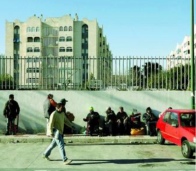They were already queuing to get back into the hostel for their lunch when I parked outside on Christmas Eve, risking leaving the car in the “Personas Autorizadas”  spaces. The line snaked right to the corner, and you could see in their posture a sort of resignation, an aspect of helplessness. All of them standing, mostly motionless, just waiting, with nothing else to do and nowhere else to be, until the hostel staff open the door to let in the waiting people.
spaces. The line snaked right to the corner, and you could see in their posture a sort of resignation, an aspect of helplessness. All of them standing, mostly motionless, just waiting, with nothing else to do and nowhere else to be, until the hostel staff open the door to let in the waiting people.
But it’s not locked. As I headed towards the door the people at the head of the queue stepped aside and a man with a scruffy beard and dead eyes opened the door to let me through. I thanked him and he looked at me blankly, expecting nothing from me, no thanks, no interaction.
Two uniformed police officers stood in the hostel foyer, relaxed, largely ignoring both the long queue outside, and the much shorter queue inside at the unstaffed reception desk. Nobody was talking. The waiting residents inside automatically made way as I queue-jumped them to peer through the reinforced glass of the reception desk.
Nobody there, so I headed for the door to the left of Reception that leads through to the offices. One of the police officers jumped across to open it for me,  simultaneously preventing a resident from following me. In her office I found the social worker that I’d been to the Consulate with for passports a couple of years ago, and told her I’d brought a carful of sponge bags, enough for all the 120 temporary residents of the Málaga city homelessness hostel. She grabbed another worker and they followed me out to unload. Just then the reception worker came back, and immediately left the queue unattended again and came to help unload.
simultaneously preventing a resident from following me. In her office I found the social worker that I’d been to the Consulate with for passports a couple of years ago, and told her I’d brought a carful of sponge bags, enough for all the 120 temporary residents of the Málaga city homelessness hostel. She grabbed another worker and they followed me out to unload. Just then the reception worker came back, and immediately left the queue unattended again and came to help unload.
Only the social worker remembered me from two years ago. The other staff were new (there is a massive turnover of staff here, it’s not a popular posting for funcionarios (the Spanish version of the civil service). Yet the residents, the police,  and the staff, had all made way for me and allowed me through the security door that separates the “front-of-house” from the staff offices without questioning me. We dumped the last sack of sponge bags indoors, they thanked me, the two policía local opened the door for me and told a resident to get out of my way (I shot him an apologetic glance but he wasn’t meeting my eyes), and I returned to my illegally-parked car.
and the staff, had all made way for me and allowed me through the security door that separates the “front-of-house” from the staff offices without questioning me. We dumped the last sack of sponge bags indoors, they thanked me, the two policía local opened the door for me and told a resident to get out of my way (I shot him an apologetic glance but he wasn’t meeting my eyes), and I returned to my illegally-parked car.
Looking back at the still waiting queue, silent, immobile, heads bowed, resigned, I could see the difference, the reason why I could walk past the queue unchallenged, why I could expect courtesy from the police, why I could walk with no compunction straight through a security door. It’s because my head was up and my shoulders  back. Because, although my clothes were as crumpled as those of the residents, I wore them with an air of confidence, of entitlement. Because although not an authorised person, I had parked in the space for “Personas Autorizadas”, confident that I could smile and blag my way out of any problem. It’s in the way you walk, and it’s in your eyes. Everybody recognises it, and it sets you apart from the people in that queue. Entitlement. Privilege.
back. Because, although my clothes were as crumpled as those of the residents, I wore them with an air of confidence, of entitlement. Because although not an authorised person, I had parked in the space for “Personas Autorizadas”, confident that I could smile and blag my way out of any problem. It’s in the way you walk, and it’s in your eyes. Everybody recognises it, and it sets you apart from the people in that queue. Entitlement. Privilege.
We don’t do presents so much now, my friends and I. Just little gifts, something nice to unwrap. It’s the thought that counts. But there in the hostel, on Christmas Eve  when the sponge bags were given out, the simple gift of a toothbrush, some shower-gel, a couple of small soaps and a razor, was intended to be both useful and thoughtful. It is about the most minimal present you can imagine. But pretty good if your walk no longer has that swagger and your head is no longer held so high, and when what you need most is a toothbrush for Christmas.
when the sponge bags were given out, the simple gift of a toothbrush, some shower-gel, a couple of small soaps and a razor, was intended to be both useful and thoughtful. It is about the most minimal present you can imagine. But pretty good if your walk no longer has that swagger and your head is no longer held so high, and when what you need most is a toothbrush for Christmas.
© Tamara Essex 2020 http://www.twocampos.com